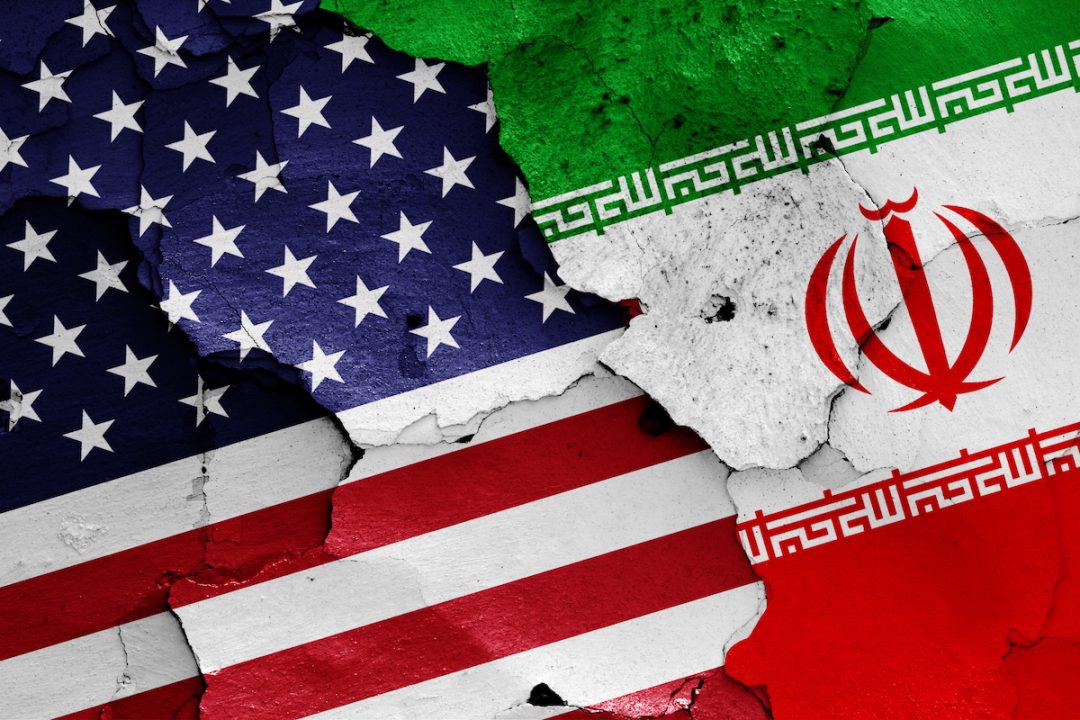
U.S. military officials say they are prepared to “go far, deep and big” if negotiations over a nuclear deal with Iran go south. Meanwhile, Iran’s military is bracing for war. And while tensions between the two nations — three if you include Israel — are running high, Director of National Intelligence Tulsi Gabbard has already told President Donald Trump that Iran isn’t building nuclear weapons.
U.S. Special Envoy Steve Witkoff and Iran’s Foreign Minister Abbas Araghchi held talks in Oman on Saturday. U.S. officials described them as “productive,” and Iranian officials said they were “positive so far.”
On Sunday, U.S. Defense Secretary Pete Hegseth told FOX News’ Maria Bartiromo that Trump “is dead serious” about prohibiting Iran from building a nuclear weapon. Hegseth said his boss wants the deal done peacefully, but added that he’s open to doing it the hard way as well:
But he’s also dead serious that if we can’t figure this out at the negotiating table, then there are other options to include my department to ensure that Iran never has a nuclear bomb. We hope we never get there. We really do. What we’re doing with the Houthis, and what we’re doing in the region, we’ve shown a capability to go far, to go deep, and to go big.
Trump has lobbed a slew of military threats against Iran.
In September, during his reelection campaign, he said eliminating Iran’s belligerence could mean “We are going to blow your largest cities and the country itself to smithereens.”
On March 30, he said that if Iran “[doesn’t] make a deal, there will be bombing. It will be bombing the likes of which they have never seen before.”
Trump also threatened Iran before approving attacks against the Houthis in Yemen earlier this month. He said:
Every shot fired by the Houthis will be looked upon from this point forward, as being a shot fired from the weapons and leadership of IRAN. And IRAN will be held responsible, and suffer the consequences, and those consequences will be dire.
Another round of talks is also scheduled to take place in Muscat, Oman, at the end of this week.
Iran’s Nuclear Program
Tehran says its nuclear program is solely for civilian use, mainly for energy and medicine production. But Western powers do not believe this, and given Iranian leaders’ past rhetoric, they’re not willing to take a chance.
Iranian leaders have made statements in the past implying that Israel should be wiped off the map. The best light in which those comments have been interpreted is to mean that the nation of Israel has no right to exist because of the deceptive and violent way it came into existence in the mid-20th century. The worse interpretation, and most common in the West, is that Jews should be wiped off the face of the earth. Moreover, Iran has a penchant for supporting terrorist groups, including Hamas, Hezbollah, and the Houthis. For these reasons, Israel and the West, among other nations, feel it’s best that Iran does not develop nuclear weapons.
The “Nuclear Deal”
Under the Joint Comprehensive Plan of Action (JCPAO) deal — or better known as the Iran Nuclear Deal — signed by President Barack Obama in 2015 and ended by Trump in 2018, Iran was allowed to enrich uranium only up to 3.67 percent purity. The International Atomic Energy Agency (IAEA) says Iran now has 275kg of uranium enriched to 60 percent, far beyond what’s needed for civilian use. Nuclear weapons need uranium enriched to 90 percent purity. Should Iran’s enrichment continue, many worry they could have everything needed to build a nuclear weapon within 18 months.
But on the U.S. side, the messaging seems almost contradictory. Late in March, DNI Gabbard said during a hearing held by the Senate Intelligence Community that Iran is not building nuclear weapons. She said:
The [intelligence community] continues to assess that Iran is not building a nuclear weapon and Khamenei has not authorized the nuclear weapon program that he suspended in 2003. The IC continues to monitor closely if Tehran decides to reauthorize its nuclear weapons program.
But Gabbard also admitted, in that same hearing, that Iran’s uranium enrichment was “at its highest levels” and was “unprecedented for a state without nuclear weapons.”
What America Wants From Iran
National Security Adviser Mike Waltz has said that Trump wants Iran’s nuclear program to be fully dismantled. This is the only position Israel finds acceptable as well. Israeli Prime Minister Benjamin Netanyahu explained what that looked like:
We go in, blow up the facilities, and dismantle all the equipment, under American supervision and execution.
However, Iran has indicated it will not consider getting rid of its nuclear program entirely. And on Saturday, Witkoff didn’t bring it up. Instead, it is said he prefers a “verification program” with restrictions that reduce fears of nuclear weaponization.
Israeli Influence?
Early last week, Trump reinforced the suspicion that at the center of this potential war lies Israel. He said:
If it requires military, we’re going to have military. Israel will obviously be very much involved in that, be the leader of that.
Israel understandably feels threatened by a nuclear-armed Iran. As noted earlier, Iranian leaders have not been shy about their opposition to the Jewish nation.
But there’s a suspicion that Israel is trying to cajole the United States into doing its dirty work. Israeli leadership has painted Iran and its proxies as a threat not only to itself, but to the United States. On July 25, 2024, Netanyahu, while addressing the U.S. Congress, said, “Iran’s axis of terror confronts America, Israel and our Arab friends.”
Former Democratic Congressman Dennis Kucinich said Netanyahu told him years ago that Israel needed the United States to take care of Iran.
Also, U.S. B-52 bombers capable of delivering nuclear bunker-busting bombs have taken part in joint exercises with the Israeli Air Force in preparation for a potential strike at Iran’s underground nuclear sites.
And Trump’s decision to pull out of the JCPAO agreement is suspected to have been significantly influenced by Israel. Netanyahu has publicly excoriated the Iran Nuclear Deal and praised Trump at length for exiting it.
Possible Consequences of War With Iran
Domestically, there seems to be zero to little benefits to U.S. intervention in Iran.
One of Trump’s most appealing reelection talking points was his anti-war record and rhetoric. During his first term, the United States didn’t start any new wars, something he was glad to brag about at campaign rallies. Also, conflict in volatile regions simmered down. Even after winning reelection, Trump repeatedly said that had he been president instead of Joe Biden, Russia wouldn’t have invaded Ukraine, and Hamas wouldn’t have carried out its horrific attack against Israel on October 7, 2023.
Politically, a war with Iran would harm Republicans. It would provide opposition fodder for Democrats during the midterms. “He ran on no new wars, but now we’re at war with Iran,” will be a major theme for Democrats. Moreover, it’ll alienate a great deal of the MAGA base. Simply put, a war on behalf of Israel will be unpopular on both sides.
Another possible consequence will be a rise in oil prices. As Kucinich pointed out, in a war with Iran, the Strait of Hormuz, a major avenue for oil transportation from several major Middle Eastern suppliers, will be disrupted. This will decrease supply, which will result in rising prices. And given that the United States is still in the middle of bringing its Drill-Baby-Drill strategy up to speed, it’s likely Americans will see a rise in gas prices. One of the main torpedoes that sunk Democrats in 2024 was the rise in gas prices during Biden’s disastrous term.
And even if the United States and Israel join their military might against Iran, that may not end its nuclear threat. The experts at the globalist-oriented Council on Foreign Relations managed to make a rare rational point:
The Islamic Republic simply has too much enriched material and has stored too many advanced centrifuges in too many places for the U.S. and Israeli militaries to destroy it all with absolute certainty. It also has many nuclear experts who can be tasked with reviving a program from the rubble. Even the United States’ own intelligence estimates project that the setback to the program from a military attack would be short-lived — perhaps just a few months. To truly stop a program by using force, the United States would need to either repeat military strikes on a frequent basis or try carrying out a regime change campaign to break that cycle, with devastating and highly uncertain results.
Will Congress Have a Say?
One missing piece in this foggy conversation about war with Iran is who should be making such a consequential decision. Former Representative Ron Paul recently observed:
If it seems bizarre that the outcome of a meeting between a US president’s designated negotiator and a foreign government minister could determine whether we plunge into possibly our biggest war since World War II, that’s because it is bizarre.
Paul goes on to remind readers that this decision should not be determined by the president or his aide:
This is an excellent example of why our Founders were so determined to keep warmaking authority out of the Executive Branch of government. No one person — much less his aide — should have the power to take this country to war.
That is why the Constitution places the authority to go to war firmly and exclusively in the hands of the representatives of the people: the US Congress. After all, it is the US people who will be expected to fight the wars and to pay for the wars and to bear the burden of the outcome of the wars. When that incredible power is placed in the hands of one individual – even if that individual is elected – the temptation to use it is far too great. Our Founders recognized this weakness in the system they were rebelling against — the British monarchy — so they wisely corrected it when they drafted our Constitution.
Paul concludes with the ever-wise advice that it is high time America stop meddling in conflicts that have nothing to with Americans. That is where Congress comes in, he said. But unfortunately, “they are nowhere to be found. And that is not a good thing.”





